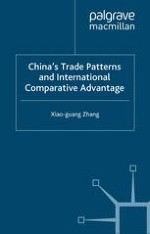2000 | OriginalPaper | Buchkapitel
Measuring Comparative Advantage
verfasst von : Xiao-guang Zhang
Erschienen in: China’s Trade Patterns and International Comparative Advantage
Verlag: Palgrave Macmillan UK
Enthalten in: Professional Book Archive
Aktivieren Sie unsere intelligente Suche, um passende Fachinhalte oder Patente zu finden.
Wählen Sie Textabschnitte aus um mit Künstlicher Intelligenz passenden Patente zu finden. powered by
Markieren Sie Textabschnitte, um KI-gestützt weitere passende Inhalte zu finden. powered by
The principle of comparative advantage has significant implications for the efficiency of resource allocation and economic growth. The term ‘comparative advantage’ is often used interchangeably with ‘comparative cost’ which is closely associated with the term ‘opportunity cost’. The opportunity cost of a commodity is the value of other commodities which must be forgone so that one extra unit of a commodity may be obtained. This is equivalent to what is expressed in the literature of comparative advantage as ‘relative price’—that is, the quantity of some commodity that must be given up in exchange for one unit of another commodity. In the classical case, the comparative advantage in a commodity is defined by the divergence between its autarkic and free trade relative prices.
